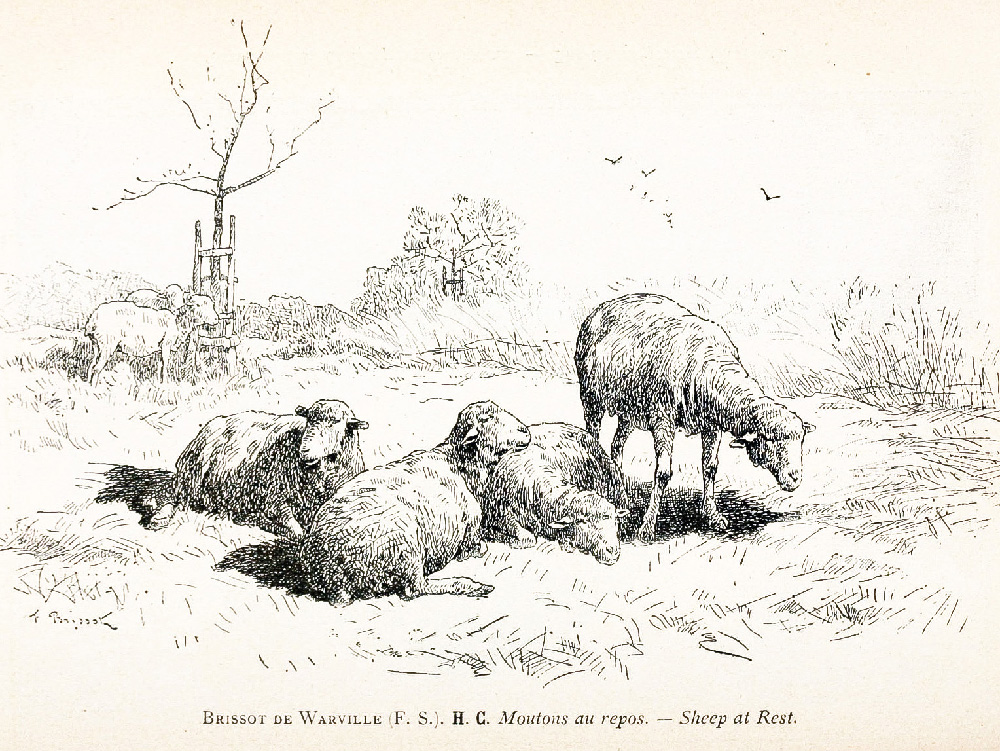1868 The farm of Preuilly

Sheep at rest - Félix-Saturnin Brissot de Warville (1818-1892)
Agricultural activities have always been at the heart of life at the Preuilly estate throughout its history, and traces of this can still be found…
In 1865, the General Council of Seine-et-Marne, wishing to encourage the modernization of agriculture in the department, created an “honorary award” and set up a departmental commission in charge of awarding it.
In 1868, the Commission was led by Charles-Félix Buignet, who served as mayor of Chelles for nearly thirty years. Three farms remained in competition when the Commission made its inspection tour, and Preuilly won over the Fortail Farm and the Noyen Farm.
The Agricultural Society of the Meaux District published in its annals the report by Mr. Buignet, from which I share below an abridged but nonetheless highly complimentary version:
« The Preuilly farm belongs to Mr. Husson and is operated by Mr. Bouchet. It covers an area of 245 hectares. (…)
When Mr. Bouchet took over the Preuilly farm, a loaded cart could not be certain of crossing the courtyard without the risk of overturning, so defective was the ground; today, this courtyard is leveled, gravelled, and perfectly sanded. (…) Walking around the courtyard, one sees a large, well-ventilated stable housing15 horses, all in good condition and well chosen for their working ability. Then comes a cowshed housing 30 cows, all raised from crossbreeds between Cotentin cows and Dutch bulls, full of health, remarkable in form, and good milk producers, clearly proving that good livestock can be raised not only in Normandy but also near Paris. (…) The milk is used to fatten calves and to make cheese or butter.
Mr. Bouchet, who is fortunately gifted in livestock breeding, has one of the finest herds of young animals in the area, mostly Merino crosses. He always keeps 900 to 1000 sheep in his barns. (…) This flock has won prizes in many competitions, and more than ever, Mr. Bouchet deserves praise for maintaining the fine shape, the fineness, the length, and the softness of the wool. Every year, Mr. Bouchet raises 400 lambs; although this flock is his own creation, Mr. Bouchet foresees that he may soon no longer be able to maintain it as a pure Merino-cross wool flock, and that he will have to adapt to the demands of the time. Large imports from Australia and elsewhere create strong competition for French products, which will likely be unable to compete successfully, and the breeder will have to change his business model to produce meat with animals that fatten quickly. (…)
If one wants to see a beautiful harvest, one must go to Preuilly—everything there is remarkable.
The wheat is very strong and uniform, the barley and oats are equal to or better than anything else we’ve seen; they are extremely clean and of superior strength. As for the forage crops, they are beyond anything one can describe. (…)
Seeing that his tenant farmer was investing all his intelligence, energy, and capital to make the farm productive and turn it into a model establishment, Mr. Husson wanted to support him with his advice, friendship, and financial help by sharing in certain expenses. Forgive me, Mr. Husson, for my indiscretion, but such acts, in my opinion, deserve to be made public.
I believe I’ve said enough about Preuilly for the large audience honoring me with their attention to judge that this establishment, in such capable hands, is truly exceptional.
Courage, Mr. Bouchet ! Continue along the path you have chosen; you deserve the congratulations of the agricultural world, and especially of the departmental Commission, of which I am the spokesperson, and which has charged me with announcing that it is awarding you the honorary prize ».
Charles-Félix Buignet
*ÉLÈVE, n. f. : Ensemble des opérations qui ont pour but la reproduction et l'éducation des animaux domestiques. (Dictionnaire de l'Académie française)